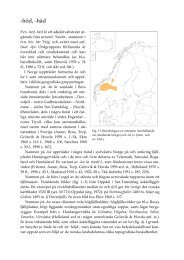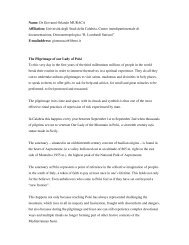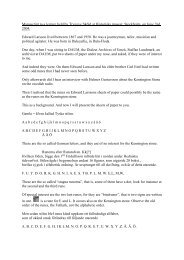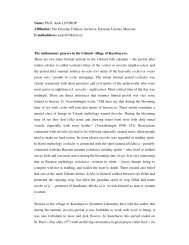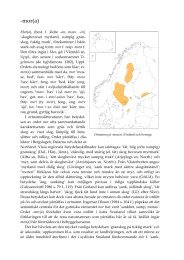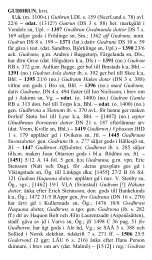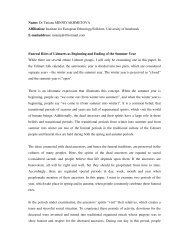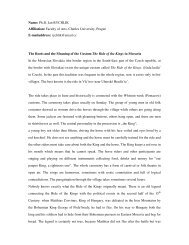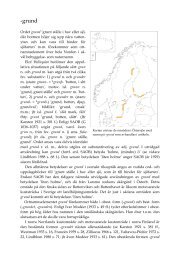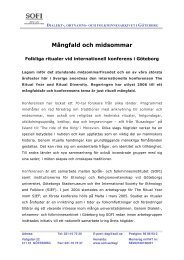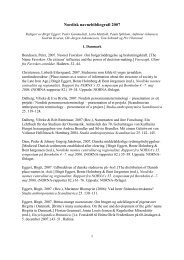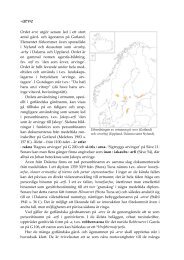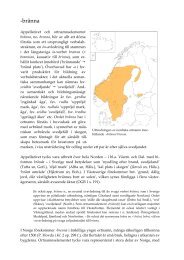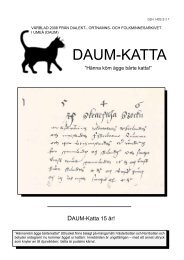NORNA-RAPPORTER 88 Binamn. Uppkomst, bildning, terminologi ...
NORNA-RAPPORTER 88 Binamn. Uppkomst, bildning, terminologi ...
NORNA-RAPPORTER 88 Binamn. Uppkomst, bildning, terminologi ...
Create successful ePaper yourself
Turn your PDF publications into a flip-book with our unique Google optimized e-Paper software.
30 Bertie Neethling<br />
The derivative pattern above is clear. The Xhosa examples in 1 exhibit syllable<br />
retention usually of the first two syllables while the rest is dropped. The opposite<br />
takes place with the examples in 2: the retention of the last two syllables.<br />
The rest is dropped. (Xhosa has an open syllable structure, i.e. syllables end in<br />
vowels. The only exception is the syllabic ‘m’.) The English and Afrikaans examples<br />
exhibit a preference for a one-syllabled shortened form, particularly of<br />
the first type.<br />
This may seem unproblematic and even predictable. The most interesting<br />
observation regarding these examples, is the following pertaining to the Xhosa<br />
examples: Xhosa first names are usually without fail semantically transparent<br />
and hence ‘meaningful’, particularly also from a cultural point of view. Names<br />
are constructed via the lexicon of Xhosa and knowledge of the language leads<br />
one to a fairly easy interpretation of the name meaning. Xhosa people generally<br />
pride themselves on their names and often consider their Xhosa names as ‘superior’<br />
to Western type names with no immediate and obvious meaning. The<br />
irony with the shortened forms is that there is invariably a ‘loss’ of meaning due<br />
to the shortening. The shortened forms now function pretty much as the<br />
Western name that is often considered as ‘meaningless’. It is also noticeable<br />
that gender name markers in female names, such as no-, is lost in the shortened<br />
forms. – A few examples :<br />
Luyanda : It (= family) is expanding<br />
Luya : no meaning<br />
Simcelile : We requested him (from a Supernatural Entity)<br />
Sim : no meaning<br />
Sandisiwe : We (family) have grown/been expanded<br />
Siwe : No meaning<br />
Vuyiseka : The one that made (us) happy<br />
Seka : No meaning<br />
The considerations that applied in the original namegiving process are no<br />
longer evident in the shortened forms, except perhaps in an indirect way via the<br />
base name. This, of course, links up with the well-known viewpoint that a name<br />
need not have current lexical value to function as a name. The pressure to<br />
shorten longer type names is so huge that this highly rated aspect of name<br />
giving among the Xhosa is sacrificed. In the similar examples from the Afrikaans<br />
and English speaking students this is not as evident, given the more ‘obscure’<br />
etymology of their names. There is an exception though: Muslim students<br />
from this group usually have Arabic names also derived from the Arabic<br />
language with clear and discernable meaning. Just as with the Xhosa personal<br />
names, these names nearly without fail represent positive and pleasant attributes.<br />
The shortening of such names has the same effect of that of the Xhosa<br />
names : the essential meaning is lost or only a partial meaning is retained.



